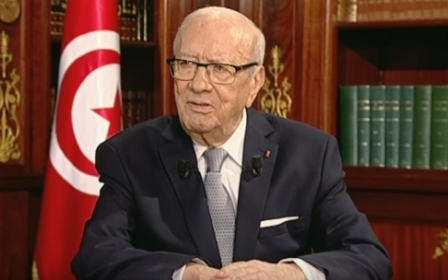UK government rejects MPs' criticism of Libya intervention

The British government on Friday rejected parliamentary criticism of its 2011 intervention in Libya, arguing its involvement saved civilian lives and claiming the Islamic State (IS) group has been weakened in the country.
The government was responding to a foreign affairs committee report, published in September, which concluded British intervention was based on "erroneous assumptions and an incomplete understanding of the evidence".
The UK and France, backed by the US, led the international community to support an intervention in Libya to protect civilians from attacks by forces loyal to Muammar Gaddafi in March 2011.
The government said its actions "undoubtedly" saved civilian lives in Libya.
"Gaddafi was unpredictable and had the means and motivation to carry out his threats. His actions could not be ignored, and required decisive and collective international action," it said in a statement.
"Our objective remained clear at all times: to protect civilians and to promote stability in Libya," the government said, adding that it was "entirely appropriate" to target military sites after the Gaddafi regime failed to implement a ceasefire.
The foreign affairs committee chairman, Crispin Blunt, said the statement showed the government was "unwilling to learn the lessons of Libya interventions".
He said accepted UK policy in Libya was initially driven by a desire to protect civilians. However, he added that the committee did not accept that the government understood the implications of the intervention, which included "collapse of the state, failure of stabilisation and the facilitation of Islamist extremism in Libya".
"The Government response does not work through the logic of the detail supplied in evidence by key figures including General Lord Richards, Lord Hague, Dr Liam Fox, Sir Alan Duncan and academics, who suggested that decisions were not based on accurate intelligence or a full understanding," he said.
The September report said "the threat to civilians was overstated and that the rebels included a significant Islamist element". It also claimed that the limited intervention to protect civilians quickly drifted into an "opportunist policy of regime change" that was "not underpinned by a strategy to support and shape post-Gaddafi Libya".
The committee held the former prime minister, David Cameron, responsible for the failure to develop a coherent Libya strategy.
"The result was political and economic collapse, inter-militia and inter-tribal warfare, humanitarian and migrant crises, widespread human rights violations, the spread of Gaddafi regime weapons across the region and the growth of ISIL in North Africa," the report reads.
"The Government has yet to appreciate the lessons from our experience in Libya, including our lack of country knowledge amongst those drafting and deciding policy. This is troubling because Libya should inform the development of future UK foreign policy," Blunt said.
He added that the UK is about to repeat the failures of Libya in Mosul in the absence of adequate plans and resources for stabilising the IS-held city after it is recaptured from the militants.
Blunt also criticised the government's rejection of the committee's recommendation to allow non-political members of the National Security Council (NSC) to request written direction from the prime minister to perform actions contrary to their professional judgement.
He urged the prime minister to consider introducing a mechanism that would allow NSC members to have their disagreements recorded.
Stay informed with MEE's newsletters
Sign up to get the latest alerts, insights and analysis, starting with Turkey Unpacked
Middle East Eye delivers independent and unrivalled coverage and analysis of the Middle East, North Africa and beyond. To learn more about republishing this content and the associated fees, please fill out this form. More about MEE can be found here.




